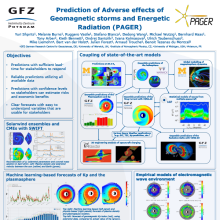Prediction of Adverse effects of Geomagnetic storms and Energetic Radiation (PAGER)
Yuri
Shprits
GFZ German Research Centre for Geosciences, DE
Poster
The PAGER project provides space weather predictions initiated from observations on the Sun to predict radiation in space and its effects on satellite infrastructure. Real-time predictions and a historical record of the dynamics of the cold plasma density and ring current allow for the evaluation of surface charging, and predictions of relativistic electron fluxes allow for the evaluation of deep dielectric charging. The project provides a 1-2 day probabilistic forecast of ring current and radiation belt environments, which allow satellite operators to respond to predictions that present a significant threat. As a backbone of the project, we use the most advanced codes that currently exist and adapt existing codes to perform ensemble simulations and uncertainty quantifications. This project includes a number of innovative tools including data assimilation and uncertainty quantification, new models of near-Earth electromagnetic wave environment, ensemble predictions of solar wind parameters at L 1, and data-driven forecast of the geomangetic Kp index and plasma density. The developed codes may be used in the future for realistic modeling of extreme space weather events. The PAGER consortium is made up of leading academic and industry experts in space weather research, space physics, empirical data modeling, and space environment effects on spacecraft from Europe and the US.

Poster PDF
Poster category:
Poster category
Geospace/Magnetosphere Research and Applications
Meeting homepage